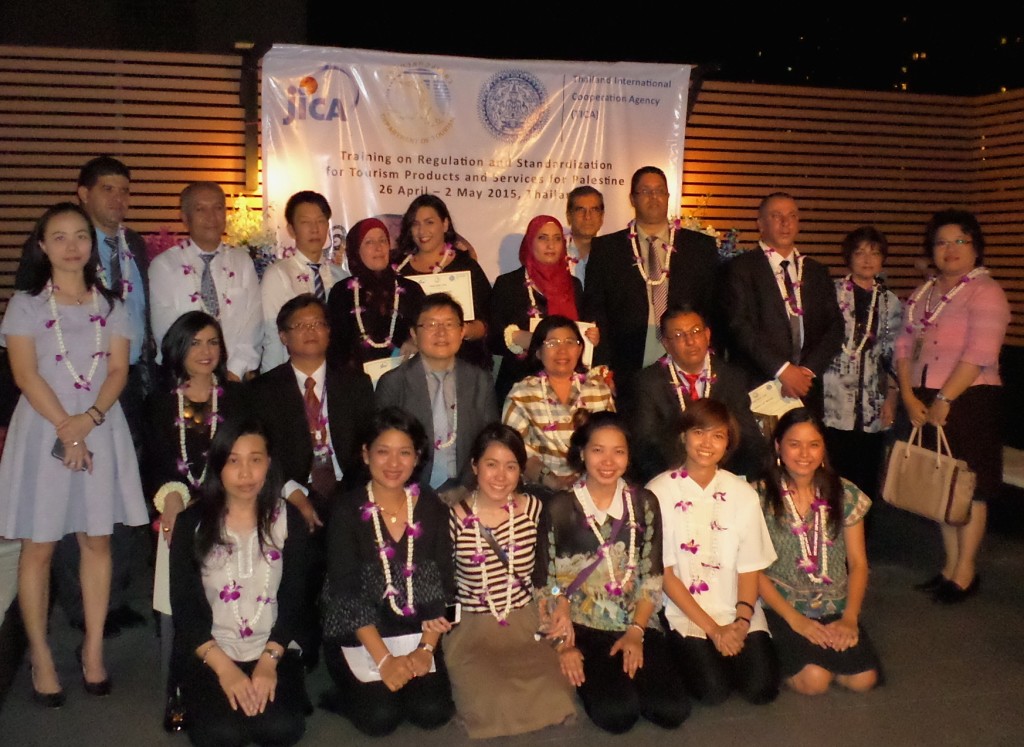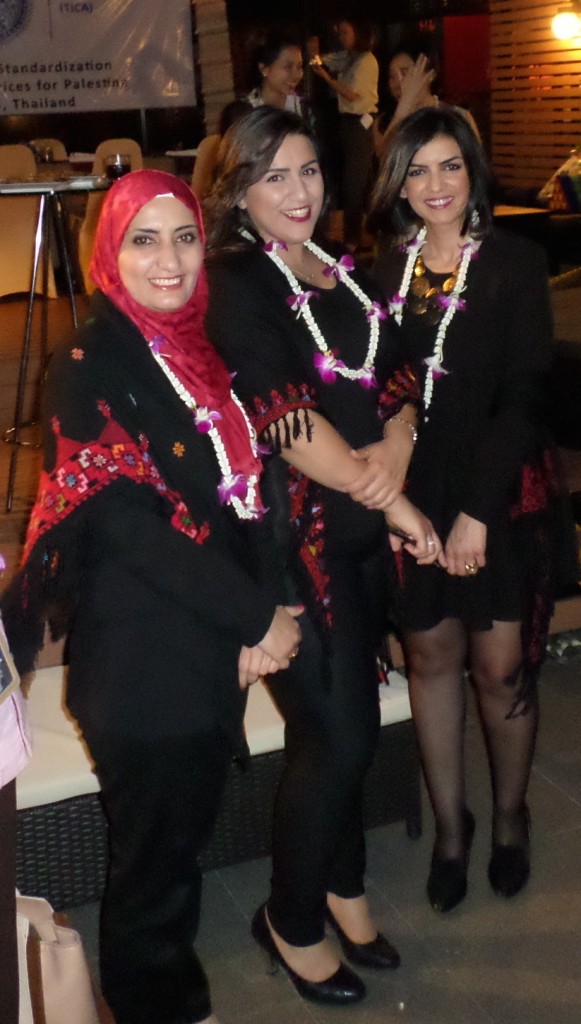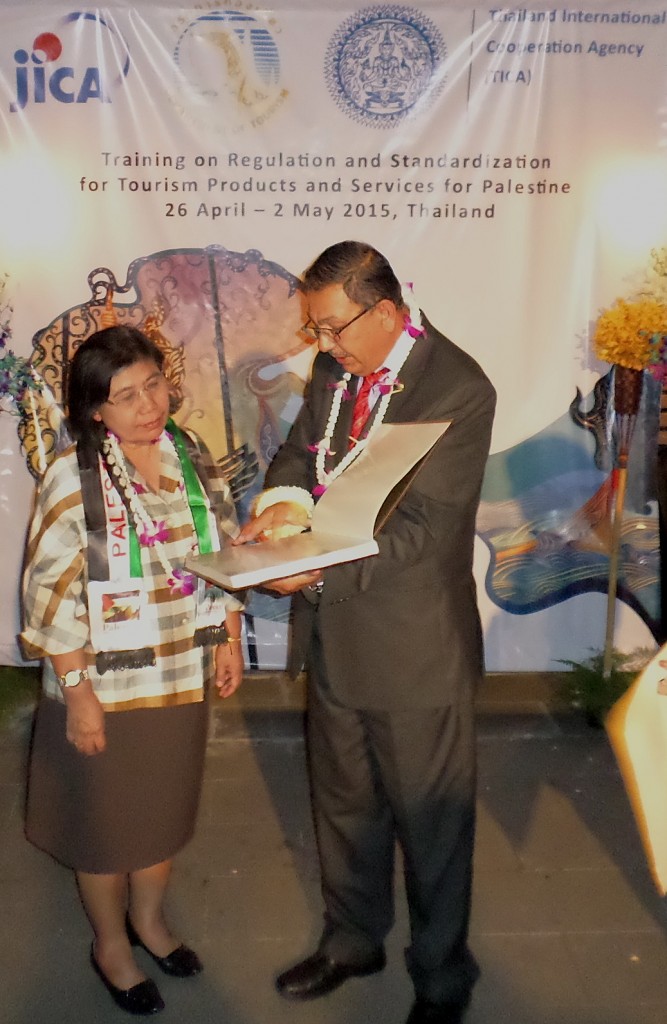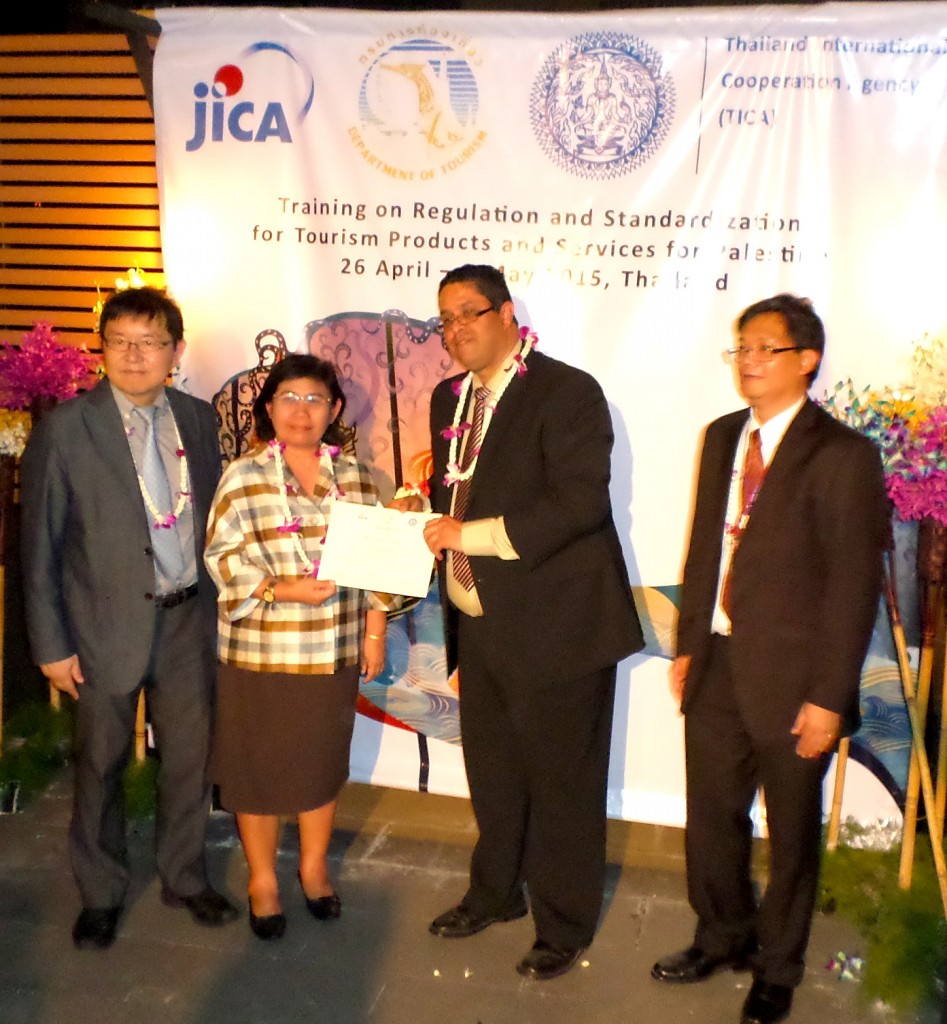
3 May, 2015
Japan, Thailand host Palestinian tourism delegation on study trip
Bangkok – A delegation of Palestinian tourism officials and private sector executives has just completed a study tour of Thailand as part of efforts by the Japanese and Thai governments to help upgrade the quality of the tourism industry in the Israeli-occupied state.
Funding for the delegation’s visit between April 26-May 2 was provided by the Japan International Cooperation Agency (JICA), the Thailand International Cooperation Agency (TICA) and the Ministry of Tourism & Sports (MoTS).
 The Palestinian delegation members with the Thai and Japanese executives and support staff at the closing dinner. |
The tour included detailed briefings on Tourism Development in Thailand, Thailand’s Tourist Guide Registration / Regulation, Thai Tourism Marketing, Promotion and Branding strategies, Management in Special Tourism Zones, Homestay and the “One Tambon One Product” concept, Community Based Tourism as well as a Case Study on Public Toilets as Standards for Tourism Services.
They also visited the UNESCO World Heritage Site of Sukhothai.
 Mrs Azza Abughaddib, Head of Legislation Department, Ms Rawan Qumsieh, Arab Hotel Association, Project Director; and Mrs Rozalin Mikel, The Holy Land Incoming Tour Operators Association, Director |
Thailand, along with 135 member countries of the United Nations, has conferred official recognition on Palestine as an independent state. It enjoys observer status in the Organisation of Islamic Cooperation and backs the Palestinians at U.N. forums.
This is the second such tourism-study mission in as many years. An earlier mission visited Thailand between 1-10 June 2014 during which the focus was more on Hospitality Training.
 Mr Ali Abusrour presenting Mrs Wannasiri Morakul, Deputy DG of the Department of Tourism, Ministry of Tourism & Sports, with a coffee table book on Palestine. |
The Palestinians have sought Thailand’s help to promote Palestine in the ASEAN market “in which Thailand is playing a leading role,” according to the official request.
This editor, well-known in Thailand as a supporter of Palestinian independence and statehood, was the only travel trade journalist invited by the MoTS to brief the Palestinians on a short history of Thai tourism, covering the strong fundamentals that support its growth as well as the challenges it faces today.
 Mr Iyad Hamdan receiving his certificate of participation from Mrs Wannasiri. Mr Ikeda of JICA is on the left, and Mr Wattanawit of TICA on the right. |
Mr. Ali Abusrour, General Director of Licensing, Ministry of Tourism & Antiquities, Palestinian Authority, also gave a briefing on tourism in Palestine to Thai tourism officials. He said that tourism has been identified as a major economic sector which can contribute significantly to national economy and job creation.
Palestine, which is devoid of any other economic resources, except agriculture, has enormous potential for religious tourism from the Islamic and Christian worlds, as well as rural tourism, health tourism, conference tourism, adventure tourism and much more.
He noted that the number of inbound and domestic visitors to Palestine shot up from 2.11 million in 2008 to 4.94 million in 2010 but has then stagnated, with only 5.08 million in 2014. However, the number of visitors who stay just one night has been rising steadily, from 557,000 in 2008 to 1.2 million in 2014.
Mr. Abusrour said that in 2014, the largest number of foreign visitors to Palestine were from Russia (425,461), followed by the USA (141,669), Italy, (88,618), Poland (67,485) and Germany (63,428).
Then come the top two Asian countries, Indonesia and India, with respectively 50,549 and 45,993 visitors. China is 14th on the list with 28,551 visitors.
The biggest problems he said that Palestine faced were in relation to the negative image as an unsafe destination, and lack of accessibility, especially the requirement for all prospective visitors to apply for visas at an Israeli diplomatic mission and undergo security checks by Israeli guards at the international points of entry, primarily the Allenby bridge border checkpoint via Jordan.
At the closing dinner, Mr. Abusrour extended his deepest thanks to the MoTS, TICA and JICA for their support and said his group had gained “new kind of knowledge and experience that we are looking to adapt in Palestine.”
He said each stop on the tour had given them food for thought, including the home-stay and community-based tourism projects. “We have thousands of cultural and historical sites, most of which are in need of good management. The model that we saw in Sukhothai is another successful story which we can adopt in Palestine.”
He added, “In Palestine, we are now always upgrading our laws and by-laws so this course is very important because we are going to start from where others finished. In other words, we are going get the best of others experience, because we are looking to have a modern Palestinian state.”
“I hope to meet all of you as soon as possible in Jerusalem, the capital of Palestine, to celebrate the declaration of our independent state of Palestine.”
Mr. Shuichi Ikeda, the JICA country representative in Thailand, said: “The priority needs for cooperation from Palestine we received there are three pillars: Management of Tourism, 2) Tourism Marketing and Promotion and Branding; 3) Hospitality Training. The program this time is in response to the “Management of Tourism” but there are still other issues necessary for the development of tourism to Palestine. It is our strong intention to consider how to support further cooperation for Palestine together with TICA.”
Mr. Wattanawit Gajaseni, Director of Country Partnership Branch, Thailand International Cooperation Agency, Ministry of Foreign Affairs, expressed hope that the “networks and friendships you have established with the Thai agencies concerned and private sector as well as the Thai people will serve as a platform for continuous cooperation in other areas of tourism sector and tourism business between the two countries and attracting more tourists to visit Palestine as a tourist destination.”
Here is the full list of the delegation members:
Mr. Ali Abusrour, Ministry Of Tourism & Antiquities, General Director Of Licensing, Palestinian Authority
Mr. Iyad Hamdan, Acting Director General Middle Governorates, Palestinian Authority
Mr. Sami Abuarqoub, Director of Hotel Classification
Mrs. Zuka Assad, Director of Inspection
Ms Azza Abughaddib, Head of Legislation Department
Mrs Rozalin Mikel, The Holy Land Incoming Tour Operators Association, Director
Ms Rawan Qumsieh, Arab Hotel Association, Project Director
Mr. Ahmed Aljafra, Director Of Tourist Police, Jericho
Mr. Jamal Takatka, Tourist Police, Deputy Director Tourist Police/Bethlehem
Ministry of Tourism and Antiquities strategies for developing and promoting tourism to Palestine
1 Tourism Products with high quality
1.1 Development of tourist facilities to be able to receive tourists
1.2 Updating legislation and regulation controlling the work of the tourism sector
1.3 Creating new tourism package and developing original tourism package
2 Promoting and Marketing Palestine as an independent, safe and distinct tourism destination
2.1 Installing Palestine exists in International Tourism Map as an independent tourism destination
2.2 Improving efficiency and effectiveness of institutions working in Tourism sector
2.3 Create an investment environment and stimulate investment in tourism and services
3 Cultural heritage sites are protected and maintained to effectively
3.1 Creating a system of effective protection of cultural heritage sites
3.2 Restoring and Managing cultural heritage sites effectively
3.3 Developing and activating the cultural heritage sector



Liked this article? Share it!